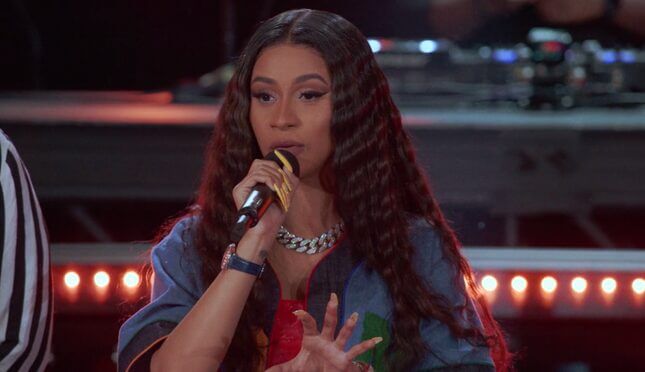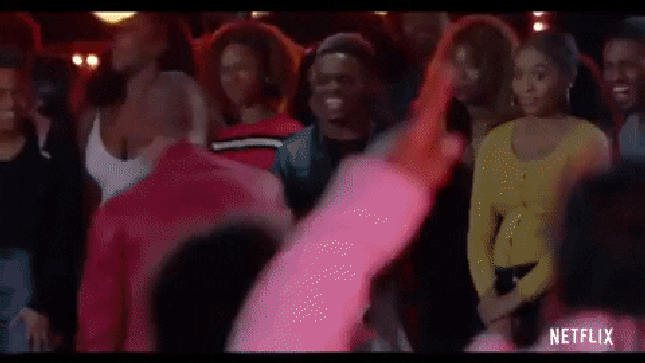
Screenshot: Netflix
Cardi B arrives to an empty meeting room at the Dream Hotel in Los Angeles, in Episode 5 of Rhythm + Flow, wearing a white bathrobe with the hotel’s name embroidered on it and a towel atop her head. While eating oysters—and ignoring that eating oysters is kind of a sensual experience—she tells her colleagues, T.I. and Chance the Rapper, who are both clothed, that she’s not dressed yet because she’s waiting for her wig; and getting ready takes her more time than it does them. The purpose of their meeting is a casual powwow. For this round in Netflix’s new rap competition series, the show’s top 30 contestants must participate in groups of cyphers, a tradition in which a small circle of rappers trade off rhyming with each other to test their wits. T.I. thinks it’ll be interesting to see “how people transition to actually having to deal with the obligations of an artist,” because, as is the show’s through line, they’re not just looking for a rapper, but a rap act who can entertain.
Ideally, Cardi B says she wants to find someone who’ll be as big as the three judges. They probably won’t. These competitions don’t exactly breed superstars as much as they create facsimiles of them. The fun of Rhythm + Flow, American Idol, The Voice, and The X-Factor is more in emotion and process.
These competitions don’t exactly breed superstars as much as they create facsimiles of them.
It’s not a revelation to say Cardi is the center of the Rhythm + Flow universe. She’s funny, empathetic, and speaks plainly, in a way that offsets some of the show’s overproduction. She is the epitome of the rapper they’re searching for in 2019. Her crystalline star quality, alongside contestants with a lesser sheen, is a testament to the difficulty of becoming a real star in a world that produces at least a million micro ones a day. Cardi, T.I., and Chance, nonetheless, want to dust off diamonds here. T.I. takes the lead as the grandfathered trap wizard. Chance is the earnest but straightforward young scholar. Cardi B is the wildcard through which much of the show’s charm and energy flows. They’re all authoritative in their own ways and recognize both the concrete and ambiguous factors that make an artist special enough to win—well, not a major-label record deal or a million dollars—but, in this case, a small but life-changing $250,000 cash prize (“No strings attached,” according to Chance) and a performance spot in Spotify’s RapCaviar Live showcase, as well as exposure. The final three episodes of the season, in what should be the first of many, are available to stream as of today.

While the logistics of stardom have changed between T.I.’s and Cardi’s eras—it’s more attuned to social media, for one (“You know I blew up on social media, and maybe you can, too,” Cardi says)—most people know a star when they see one. Talent and charisma is a given, but rap also values authenticity, bravado, style, lyrics, humor, and life experience in one package. Emotion fuels many TV talent shows—footage of contestants in their homes, explaining why they think they’re one in a million—which makes it wild that, while Idol has had two lifetimes, a mainstream rap talent show hasn’t exploded. Especially for a genre that’s so competitive. (For what it’s worth, Lifetime has aired Jermaine Dupri’s The Rap Game for five seasons with no standout winners.) The visceral backstories in rap happen to be a minefield of emotion.
But Cardi is wise in saying struggle alone won’t save these artists. “Every rapper got a sad story. I got a terrible story,” she says during New York auditions at the popular venue S.O.B.’s. “We all got the struggling story, so we cannot be going for the struggling stories.” She’s looking for someone relatable and knows the 50 Cent-era hustle narratives that worked in the mid-2000s don’t necessarily sell now. Self-awareness works. She admits, “I’m selling boobs, I’m selling ass, and everything.”
These moments place hip-hop on the studious level it deserves, as the world’s most influential culture, and allow people to see a chemistry that’s so easily ignored.
There are moments where she and the other judges tell contestants, bluntly, they need to not just rap well, but also know how to make hit songs that reflect their personalities—plus have an image and stage presence. To a rapper named Sam Be Yourself (that is his name), they explain that he needs a story beyond his being a white rapper in a black space. Cardi calls him Bill Gates’s son three times. She references white listeners a little too much, if realistically, and talks money and marketing a lot, a message I’m sure reads sad to hip-hop purists. But the point is that being a rapper is, in fact, a grind. Rapper King Los, while coaching one contestant, breaks down the importance of spacing and cadence in rap. These moments place hip-hop on the studious level it deserves, as the world’s most influential culture, and allow people to see a chemistry that’s so easily ignored.
The rappers on Rhythm + Flow are not that great. Too many of them forget their lyrics, when half the battle of rapping is memorizing words; and even the more experienced rappers with local reputations (Sasha Go Hard, from Chicago) expose their seams during cyphers, in the studio, and shooting music videos. There are no Cardi Bs, Chances, or T.I.s in sight. Just loads of potential. A rapper named Old Man Saxon wears jazzy suits and has a standup comedian’s demeanor. Beanz, a tough Puerto Rican found in New York, is vicious but needs softening. Ariyon, an 18-year-old who shows the most promise, flames out over lack of focus. And I would really like Flawless Real Talk to shorten his stage name.
What kept me hooked on star-making shows like MTV’s Making the Band or Vh1’s cult hit Ego Trip’s Miss Rap Supreme wasn’t the musical talent as much as it was the people and procedural, and, yes, the drama. Because the Rhythm + Flow contestants aren’t living under one roof, the Dylan-spitting-hot-fire moments elude them, though one rapper does think his flubbed line about being a prostitute will become a meme. (It hasn’t.) Trying to like some of these contestants is like easing into a double dutch rope. If only they showed a little more tenacity, rapped with more oomph, and provided a spark. The posturing they see as stardom is often not. But it’s hard to be a great rapper and even harder to become a rap star.
More than Idol and X-Factor, Rhythm + Flow affirms how sacrificial a life in the music industry is, particularly the precariousness of rap as an outlet for black and brown people. Reality TV competitions have in many ways surpassed traditional local talent shows as a route to success, or at least a shot at it. In one episode, Cardi notes that when she went back and listened to her first mixtape, she cringed, because why did no one told her she was rapping like that? She needed work and would not have become a star without it. This show must continue, if only so that other aspiring rappers, clueless to how the industry works—those who like to slide into DMs and comment sections to appeal to tastemakers—can have something of a home now. Even if they never become major.